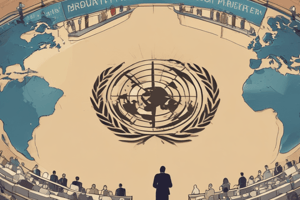Podcast
Questions and Answers
What is the primary purpose of the Universal Declaration of Human Rights (UDHR)?
What is the primary purpose of the Universal Declaration of Human Rights (UDHR)?
- To provide guidelines for political advocacy.
- To establish legal penalties for human rights violations.
- To set fundamental human rights for universal protection. (correct)
- To promote economic development globally.
Which of the following best defines privilege in the context of human rights?
Which of the following best defines privilege in the context of human rights?
- Unearned advantages granted to certain groups. (correct)
- Legal rights protected from discrimination.
- Unjust treatment based on group identity.
- Equal treatment of all individuals regardless of their background.
Which method is commonly used in political advocacy to promote human rights?
Which method is commonly used in political advocacy to promote human rights?
- Lobbying government officials and institutions. (correct)
- Public protests without organized campaigns.
- Purchasing media time to spread awareness.
- Gaining international military support.
What form of discrimination is characterized by policies that indirectly disadvantage a specific group?
What form of discrimination is characterized by policies that indirectly disadvantage a specific group?
Why is gender equality considered essential in society?
Why is gender equality considered essential in society?
What role do NGOs play in the protection of human rights?
What role do NGOs play in the protection of human rights?
What is a common challenge faced by political advocates for human rights?
What is a common challenge faced by political advocates for human rights?
Which of the following is a form of gender-based discrimination?
Which of the following is a form of gender-based discrimination?
Flashcards are hidden until you start studying
Study Notes
Law and Human Rights
- Definition: Human rights are moral principles that describe standards of human behavior and are protected as legal rights in national and international law.
- International Framework:
- Universal Declaration of Human Rights (UDHR) - establishes fundamental human rights to be universally protected.
- International Human Rights Treaties (e.g., ICCPR, ICESCR) - legally binding on ratifying countries.
- National Laws: Many countries incorporate human rights principles into their constitutions, statutes, and judicial decisions.
- Enforcement Mechanisms:
- Regional bodies (e.g., European Court of Human Rights) and UN mechanisms to monitor and enforce compliance.
- NGOs and civil society organizations play a crucial role in advocating for adherence to human rights laws.
Political Advocacy
- Role of Advocacy: Influencing legislation and policy to promote and protect human rights.
- Methods:
- Lobbying government officials and institutions.
- Grassroots mobilization to raise public awareness and support.
- Legal action to challenge injustices and hold violators accountable.
- Key Organizations:
- Amnesty International, Human Rights Watch, and other NGOs that advocate for human rights protection globally.
- Challenges:
- Resistance from governments and powerful entities.
- Restrictions on freedom of speech and assembly in various countries.
Privilege and Discrimination
- Privilege: Unearned advantages given to certain groups based on characteristics like race, gender, or socio-economic status.
- Discrimination: Unjust treatment of individuals based on their group identity, violating the principle of equality before the law.
- Forms of Discrimination:
- Direct (explicit exclusion) and indirect (policies that disproportionately affect certain groups).
- Systemic discrimination embedded in institutions and societal norms.
- Addressing Discrimination:
- Anti-discrimination laws and policies (e.g., affirmative action).
- Education and awareness campaigns to challenge stereotypes and biases.
Gender Equality
- Definition: The state in which access to rights or opportunities is unaffected by gender.
- Importance: Essential for economic development, social progress, and the realization of human rights.
- Key Issues:
- Gender-based violence, wage gaps, and underrepresentation in leadership positions.
- Reproductive rights and healthcare access.
- International Framework:
- Convention on the Elimination of All Forms of Discrimination Against Women (CEDAW) - a key treaty promoting gender equality.
- Advocacy and Progress:
- Global movements (e.g., #MeToo, HeForShe) raise awareness and push for policy changes.
- Importance of education and empowerment programs for women and girls.
Law and Human Rights
- Human rights are moral principles defining standards of human conduct, recognized as legal rights at both national and international levels.
- The Universal Declaration of Human Rights (UDHR) serves as a cornerstone for global human rights protection.
- International human rights treaties, such as the International Covenant on Civil and Political Rights (ICCPR) and the International Covenant on Economic, Social and Cultural Rights (ICESCR), obligate ratifying nations to uphold human rights standards.
- Various countries embed human rights within their constitutional frameworks, statutes, and judicial practices, reflecting their legal commitment to these principles.
- Enforcement of human rights relies on regional judicial bodies, like the European Court of Human Rights, and United Nations mechanisms designed to oversee compliance.
- Non-governmental organizations (NGOs) and civil society play essential roles in advocating for human rights adherence and promoting accountability.
Political Advocacy
- Advocacy focuses on shaping legislation and policies that foster and protect human rights.
- Key methods include lobbying policymakers, grassroots mobilization to enhance public awareness, and legal actions to combat injustices.
- Prominent organizations, such as Amnesty International and Human Rights Watch, are integral to global human rights advocacy and protection efforts.
- Political advocacy faces challenges, including governmental resistance and restrictions on fundamental freedoms like speech and assembly.
Privilege and Discrimination
- Privilege refers to unearned advantages afforded to specific groups based on attributes such as race, gender, or socio-economic status.
- Discrimination involves unfair treatment of individuals due to their group identity, contravening the principle of legal equality.
- Discrimination manifests in two forms: direct discrimination through explicit exclusion and indirect discrimination via policies that negatively impact specific groups.
- Systemic discrimination is deeply ingrained in institutional structures and societal norms, necessitating comprehensive approaches to address it.
- Strategies to combat discrimination include implementing anti-discrimination laws, like affirmative action, and conducting educational campaigns to dismantle stereotypes and biases.
Gender Equality
- Gender equality is characterized by equal access to rights and opportunities, irrespective of gender.
- Achieving gender equality is crucial for fostering economic development, social advancement, and the upholding of human rights.
- Key issues affecting gender equality include gender-based violence, wage disparities, and the underrepresentation of women in leadership roles.
- Access to reproductive rights and healthcare services also plays a significant role in advancing gender equality.
- The Convention on the Elimination of All Forms of Discrimination Against Women (CEDAW) is a pivotal treaty aimed at promoting gender equality globally.
- Advocacy efforts, including movements like #MeToo and HeForShe, highlight gender issues and drive policy reform.
- Education and empowerment initiatives for women and girls are vital in promoting gender equality and fostering sustainable change.
Studying That Suits You
Use AI to generate personalized quizzes and flashcards to suit your learning preferences.





